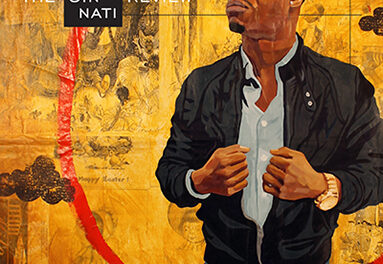Wendy can’t help hovering outside the den when her fourteen-year-old daughter’s older friend Harris first comes over to play video games on a Saturday. They’re talking about a woman named Cora Goodnight, all over the local news for killing (probably) her three husbands and her pastor. The church-directory photo posted with each telling of her story shows a pale woman with listless brown hair, ashen cheeks, and an undernourished, unsmiling mouth. Only her startled eyes suggest the energy Wendy imagines murder must require.
“The megachurch Cora went to?” the boy is saying. “It’s basically a cult.”
“No wonder she offed the preacher,” Megan says. “I mean, she goes to this place for peace and comfort, and they just mess her up more.”
“They must have been brutal. Brutality masquerading as holiness.”
It could be Wendy and Fiona talking—if they still talked. She’d known the boy must be Fiona’s as soon as Megan named the senior she’d met in the high school band. Harris McAllister. She pronounced it tenderly, wistfully, as though he were a dream anyone would want to have. And he is, Fiona’s boy, seventeen now, a lovely young man, a dream—the first newborn Wendy ever kissed, his warm wrinkled head soft and yeasty, fresh from her best friend’s tortured insides. She last knew him as a gleeful two-year-old, smearing chocolate across a dingy duplex wall blocks from Tate Street Coffee, where Fiona and Wendy, in their thrift-shop dresses and steel-toed boots, used to study and plot.
Fifteen years Wendy’s heard not a word, and then this boy appears at her door wearing a bold, busy knitted hat with side tassels, a hat that looks like it can’t decide whether it’s Peruvian or Norwegian or the result of an abandoned attempt to knit an Orthodox Jew out of stoplight-colored yarn. That’s the sort of thing Wendy used to say to Fiona to try to make her laugh.
Here were Fiona’s quick dark eyes flashing at Wendy once again—the boy grinning at her and Megan through the storm door, September bright and hot behind him, the leaves still clinging to the trees—and she’s as weak for that flash as ever. How could she not make a feast of the boy? She took his polite extended hand, clasped it a little too warmly, and pulled him by his long spiderish arm over the threshold. She offered seltzer, coffee, cookies, and welcomed him to sit on the sofa next to her daughter to hunt demons or zombies or whatever the fuck it is they go after.
Sophomore year, UNC Greensboro, 1991: Wendy’s smoking out front of McIver after Renaissance Poetry when this lanky girl with dyed-black hair borrows her lighter. As cleaner-cut students cross the sun-dappled campus paths, the girl tells Wendy the filthiest joke she’s ever heard another girl tell. Delighted, Wendy asks her name. Fiona. Delighted again.
The following afternoon, there she is in Intro to Theater—the dirty-joke girl! Wendy liked acting; Fiona, the black-clothed tech jobs. Important things occurred out in the world—the aftermath of the Gulf War, Waco, the Rodney King trial—but what was all that, next to The Taming of the Shrew or The Little Foxes? Semester after semester, each play was a self-contained world they inhabited intensely for a time, then left behind forever.
They became Wendy and Fiona, a package deal wherever they went. Back then, she’d have told you their kids would grow up as close as siblings. Instead, Megan and Harris are slowly getting acquainted over the noise of their games. Megan made Wendy promise not to spy on them when Harris came over. Wendy’s husband, Chris, demanded just as adamantly that she keep an eye on the kids.
“What on earth can they do with the door open and me wandering around the house?”
“You never know.” Chris scowled.
“Megan’s a good girl—she makes straight As.”
“So did you.”
True. Wendy made dean’s list the same semester she rode high and shirtless down Battleground Avenue in Fiona’s crappy car, scarfing hot Krispy Kreme donuts and screaming the words to “Welcome to the Jungle”—ironically, of course—as the wind whipped and mingled their long hair.
She said to Chris, “Dude, after all that mess in middle school, you should be grateful she has a nice friend.”
“I’d be grateful if he was also a freshman. And a girl.”
Quick peek into the den: Megan sits cross-legged against the pillows banked in one corner of the sofa. She watches Harris, who’s leaning forward, elbows on knees, gripping the bat-shaped controller. He watches the figure on the screen intently, as though if he could, he’d eat it, or kiss it, or worse. The figure runs, jumps, shoots, jumps, circles back, pockets treasure, and runs again. As Harris frantically taps buttons, he explains to Megan details about the game’s strategy that she’s belabored to Wendy many times.
“Oh,” Megan says to him, “it’s super smart you figured that out.”
Not a shred of sarcasm. She’s fawning. Pretending it’s all news to her, and he’s the genius. Ugh. Did Wendy teach her to act like that?
Back in the day, Fiona and Wendy would have had things to say about such a performance.
Pretty soon, Wendy would’ve said, this girl is going to be sorry.
Oh, this girl, Fiona would’ve answered—sliding a loose fist back and forth near her lips and pretending to gag—pretty soon, this girl is going to wind up on her knees.
Soon it’s a regular thing, Harris and Megan gaming on Saturday afternoons. Whenever he stays for dinner, he wears his silly hat at the table—slight points off for Fiona—but he says please and thank you, unlike Chris, too busy shoveling food into his mouth to do more than nod. He eats the same way he fucks,Wendy told Fiona, before she knew she’d love him, much less marry him. All hulked over and in a rush, like he’s got somewhere he needs to go after. Then, she took his haste for passion. Now, she knows it’s mostly appetite.
Harris always responds graciously to Chris’s barrage of questions. Talking comes naturally to the boy. He has his mother’s gift for putting people at ease. At parties, Fiona lavished attention on everybody she met, asking them all about themselves, enthusing over whatever they said without ever sounding fake. Meantime, Wendy would hook up with any old boy, needing a talkless way to pass the time until Fiona was ready to go.
“I’m working at a pizza place now,” Harris said, the first time he accepted Wendy’s invitation to dinner. “But I want to major in graphic design when I go to college. If you don’t mind me asking, sir, what do you do?”
Megan gave Wendy the quick secret smile they share when they’re getting the best of her dad and he doesn’t have a clue. Wendy wondered if her daughter primed Harris to ask this question. Chris loves explaining the intricacies of his duties as shipping and receiving manager for an easy-chair company.
“Well, basically, I run interference between the salespeople, the warehouse staff, and the bossman’s incompetent son. Everything’s a puzzle, all the time, and it’s up to me to solve it. Like today, for instance, I had to figure out why my Lubbocks in Desert Sand went to my Charlotte store instead of here to Greensboro.”
Since his promotion to manager, he’s all “my.” My chairs, my stores, my trucks, my guys.
“So you’re like constantly putting out fires,” Harris said. “Sounds like a tough job—you must be really organized.”
“It’s a lot to keep track of, that’s for sure.”
He began to warm to the boy—after all, Chris likes a pat on the head as much as anyone. Every year at the company holiday party, his gross boss puts his gross arm around Wendy and says he doesn’t know what he’d do without her husband. It’s Christmas, so she plays nice. She says, “Me either,” and Chris beams. He thinks she’s forgotten the first five years of their marriage, when she had to take care of everything—Megan, money, the house, everything—because he couldn’t stand growing up. Wendy always had a job—sometimes a full time and a part time—while Chris was always losing jobs because he was too hungover to go to work the morning after a Green Day concert or a night out with his buddies from his failed band. He left the dishes and laundry to pile up, never fixed a meal. He spent money they didn’t have and then forgot to pay the bills. He insisted Megan stay in day care because he needed to look for work, then dragged his feet about looking for work.
Wendy laid down an ultimatum. He apologized, he begged, he loved her more than the sun and the moon, I wrote you a song, baby, don’t go. The whole bullshit package. More ultimatums, more scenes. She would have left except she was a sucker for contrition. And then: a miracle. When Megan was four, he got the job at the furniture company, which he turned out to be good at, and—miraculously—actually liked. Wendy stopped having to worry about whether she could depend on him for basic things. Chris stepping up to his responsibilities felt like all the miracle she’d ever need in her marriage. She knew plenty of women who weren’t so lucky.
“And what about you?” Harris said that first evening, turning to Wendy. “What do you do?”
“Me? I’m an administrative assistant in a law firm.”
“Any chance you’re working on the Cora Goodnight case?”
“Oh, brother,” said Chris. “Wendy’s obsessed with that woman.”
“I’d be nervous if I was you, Dad,” Megan joked, making a stabby motion with her spoon.
“We do family law, not criminal cases,” Wendy said.
“I’m stalking Cora Goodnight.” Harris grinned. “Online, I mean.”
Wendy understood. That same morning, after reading the latest developments in Cora’s case—they’d finally assembled a jury, and the evidence was now being heard—she’d googled Fiona again: two old addresses and a Facebook page with forty-seven friends, set to private. No Twitter or Instagram, no LinkedIn, not even Goodreads. Wendy had searched her name in the county tax records to see if she owned a home and, if so, where she lived. Nothing. No internet sensation, Fiona McAllister.
“She was super devious.” Harris paused to lick chili from his hat’s golden tassel, then launched into an informed analysis of Cora’s lethal combinations of ordinary household cleaners. Megan raised her eyebrows at her mother: See how smart he is?
“That woman had a hard life,” Chris said, reaching for the bread.
Journalists relished detailing the lifetime of abuse heaped on Cora: drunk mother, hands-on stepfathers, charlatans paid to miracle-heal her limp. At eighteen, she married a man no better than the other people she’d tried to love. He died prematurely, as did her second husband, and everybody said she had the worst luck. Then she wed a third time, a wounded Persian Gulf veteran who regularly laid his cane across his wife’s back to remind her that her weakness exceeded his. Before long, he turned up dead too, another “accident.”
“You kids are lucky. Guys in my warehouse—they’ve got dads in jail, moms on drugs, poor situation, no opportunity. You have to think about what that does to a person before you judge.”
“Who’s judging?” Megan protested. “Don’t get mad at me! Everybody knows her life was horrible.”
Whenever Harris stays for supper, they have to eat in the dining room instead of at the tiny kitchen table. Wendy’s never liked this room. At sundown, the yellow walls sour from cheerful butter to wan buttermilk, and once it’s fully dark outside, the windows become mean black patches that put them on display to anybody passing by.
“Paint the room a different color,” Fiona would have said. “And we’ll make some curtains. It’s not hard.”
Fiona on her best days got shit done. Wendy itches to ask Harris a million questions about her, but she doesn’t want Chris figuring out he’s Fiona’s kid, not yet. Chris used to call Fiona a user—not drugs, people—which was funny to Wendy, because Fiona thought the same of Chris. When either of them said it, Wendy thought I guess I have a type.
So far Harris has mentioned only that his mother sells plants at a nursery, is twice divorced, and named their cat Bogart, which Harris thought for the longest time was a reference to the boggarts in Harry Potter.
“Those dudes Cora killed totally deserved it,” Megan says one night when Harris brings pizzas and they’re all sitting in the yellow gloom.
“Ah, the moral certainty of untested youth,” Wendy says. They all ignore her.
Chris objects that nobody deserves to be murdered.
Harris can’t help feeling sorry for Cora, even though he’s 100 percent certain she’s guilty.
Wendy takes another slice and says nothing. Whenever she reads about Cora’s victims, all she can think is, What did you do, man, to push her that far?
. . .











